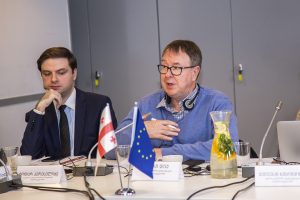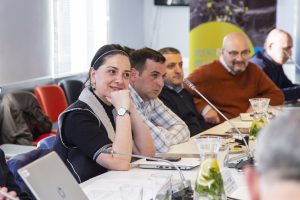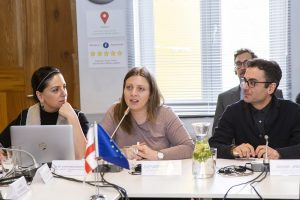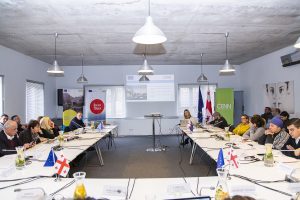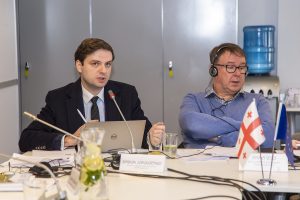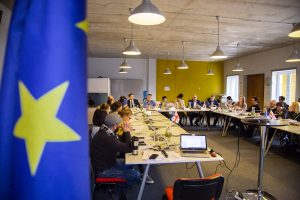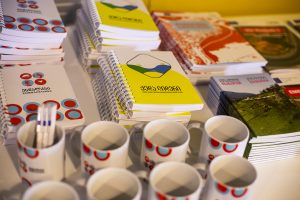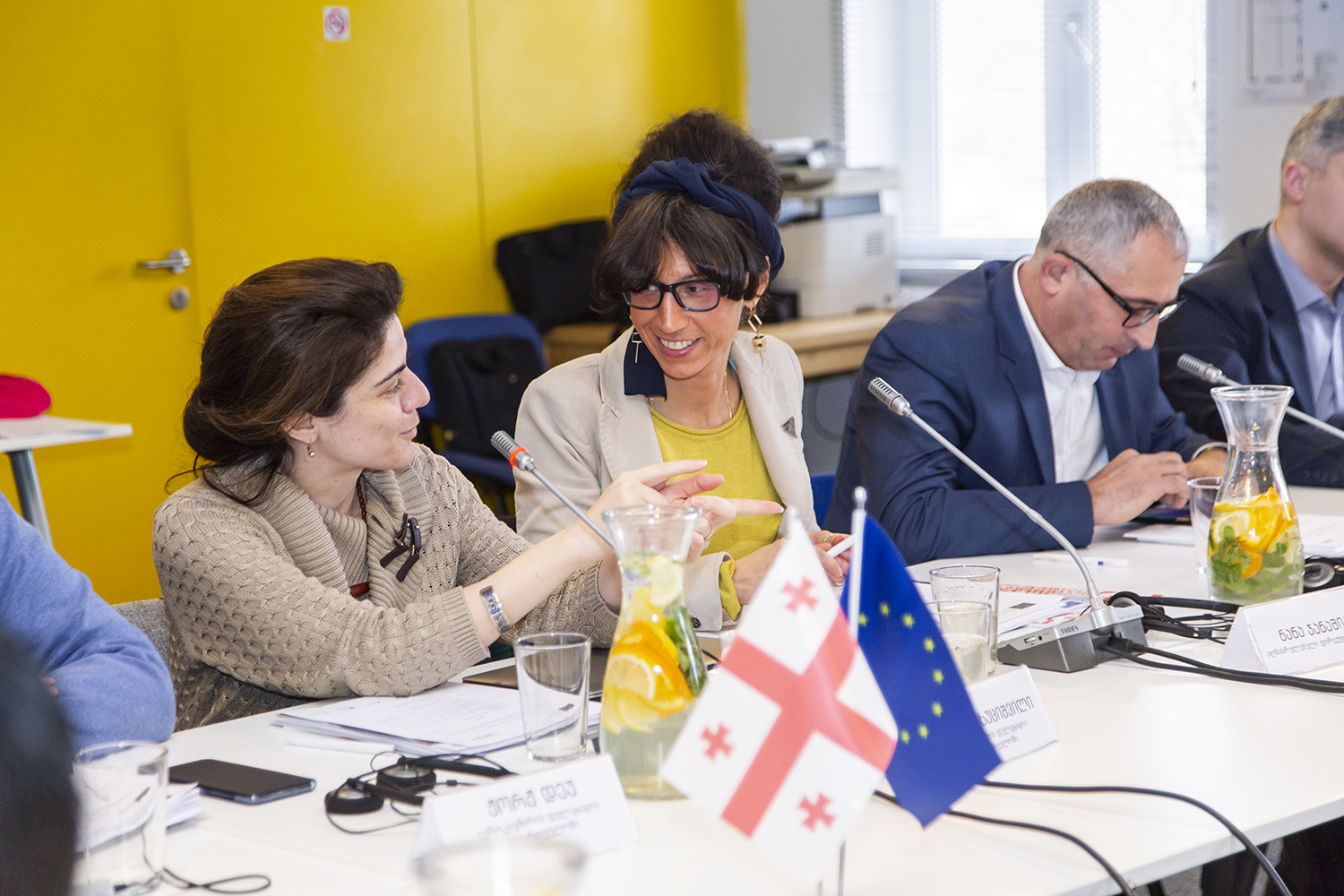February 25, 2020. Bulachauri – representatives of The European Union-supported ENPARD program in Georgia, the Ministry of Environmental Protection and Agriculture of Georgia, Ministry of Agriculture of Ajara AR and ENPARD implementing partners gathered at the next Steering Committee meeting organised by ENPARD partner CENN under the organization’s ongoing EU-supported projects, “Keda LEADER” and “Embrace Tsalka.” The event took place at the Bulachauri Green Center and aimed to introduce the activities carried out and planned within the projects, exchange information and recommendations among involved counterparts and develop future cooperation.
Opening remarks were delivered by CENN’s Executive Director, Nana Janashia. During the meeting, the delegation of the European Union to Georgia – Project Officer Mrs. Ketevan Khutsishvili and Attaché, Programme Officer of Agriculture, Fisheries & Food Safety, Mr. Georges DEHOUX, addressed the participants and talked about the importance of a bottom-up approach:
“The main purpose of our meeting is to share the experiences gained within the projects and the challenges we have faced since the project implementation up until now, which should be of interest to the Steering Committee members. The EU Delegation to Georgia, the Deputy Minister of Environmental Protection of Adjara, representatives of various LAGs and stakeholders are taking part in the event, which is a good opportunity to share opinions and perspectives from different points of view. Many thanks to the EU Delegation to Georgia for both political and financial assistance, as they are both very important for the democratic development of the country. It is noteworthy that we held a meeting of the Advisory Board for the Rural Development Program in the village of Bulachauri Green Center, where local women are employed. ” – Nana Janashia
“I am very pleased that the interest the regions have in the development of the region at the local level is more in the case of EU funding for Georgia. The slow but steady progress that accompanies rural development in this country is at the forefront of democratic processes. What the EU is doing in Georgia is to promote democratic reforms with the logic of what democracy should be based on. The development of agriculture should begin with the direct involvement and identification of the needs of those who are facing current challenges. We, on the one hand, define the Georgian political line and on the other hand, the resource contributors to the development of the country’s agriculture and statehood through democratic principles, local needs and the application of the bottom-up approach. The role of the various implementing organizations and actors involved in achieving this development is important, as is the state’s readiness and support. It is also important for LAGs to promote sustainability so that they can continue to operate as projects finish. ” – Ketevan Khutsishvili
“I very much believe in a bottom-up approach not only for local development, but also for local democracy, this is something that is extremely important. What you are building now will be very important for the future of Georgia. We are glad that you are following the EU approach, but it is important to make it your own, because you are not in the same context as other EU countries. You should find ways that will be beneficial for your communities and recognition and openness from the government is crucial for better future development and sustainability.” – Georges Dehoux
In addition, presentations were conducted by the Chairs of the Keda and Tsalka LAGs, who spoke about the current state and future plans of the ENPARD project and LAG activities in Keda and Tsalka Municipalities. In addition, a number of possible joint initiatives aiming at strengthening partnerships between Georgian LAGs and their corresponding municipalities were announced. Other respective guests included Nodar Kereselidze, the National Project Manager at UNDP Georgia, who gave an overview of the planned actions within ENPARD III; and Juba Maruashvili, Senior National Grant Management Expert for FAO-ENPARD projects in Georgia, who presented on the points concerning FAO support for the agriculture sector in Georgia under ENPARD III.
During the meeting, a panel discussion was held in which participants talked about existing challenges and opportunities that LAGs face today. Representatives from government entities, implementing organizations and members of the LAGs discussed the importance of a bottom-up approach and the importance of the sustainability of LAGs at the local governing level.
“It is very good that we meet and discuss rural development issues in detail. One of our top priorities is rural development, and we must say that we already have a small enterprise development grant this year, and in cooperation with local people and LAGs, we will strive to advance this priority. In addition, the recognition and promotion of civil society and LAGs by the state is important for a better future of the village, the region and the country.” – Jambul Khozrevanidze
The following topics were also discussed at the meeting: The European Green Deal and its connection to Georgia; the effectiveness of the LEADER approach, the importance of Waste Management, Green Economy, Community Mobilization and LAGs’ involvement in the decision-making processes and the importance of cooperation between different governmental institutions and LAGs.
At the end of the meeting, the participants agreed to carry out activities in co-ordination with the ongoing projects and interested stakeholders.
The EU-supported ENPARD projects “Embrace Tsalka” and “Keda Leader are implemented by CENN in partnership with the Center for Strategic Research and Development of Georgia (CSRDG), Institute of Democracy (IoD), Austrian Institute for Regional Studies and Spatial Planning (ÖIR), the Georgian Farmers’ Association (GFA) and Institute for Rural Development Research (IfLS). The project aims at diversifying local economic activities, improving the investment climate, and empowering competitive agricultural and environmental practices in Keda Municipality via bottom-up strategic planning of rural development.
The EU is supporting agriculture and rural development in Georgia through its ENPARD Programme. Implemented since 2013 with a total budget of EUR 179.5 million, the main goal of ENPARD is to reduce rural poverty in Georgia. The first phase of ENPARD in Georgia focused on developing the potential of agriculture. The second and third phases of ENPARD focus on creating economic opportunities for rural population that go beyond agricultural activities. More information on ENPARD is available at: www.enpard.ge.

